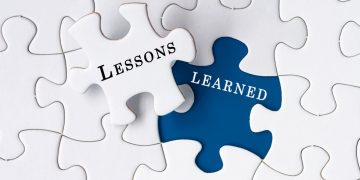Following the announcement that industry veteran Goh Chung Hun has returned to Lloyd’s Register to take the helm in Singapore, he gave an exclusive interview to SAFETY4SEA to discuss his key priorities.
He notes that the industry is evolving at a rapid pace, with the usual shipping segments experiencing more frequent cycles. This creates opportunities for classification societies to offer services beyond their traditional class and statutory roles. In this context, as the new President of LR’s Singapore branch, Goh Chung Hun aims to focus on enhancing expertise, evolving the organization to become the partner of choice for its clients, and creating an attractive working environment.
SAFETY4SEA: As the new President of LR’s Singapore branch, what are your key priorities on the agenda for the next five years?
Goh Chung Hun: LR has been and is still going through a transformation in the last couple of years in terms of organsational structure and work processes. This has improved the quality of service delivery that both LR and our clients have become accustomed to and expect, including both LR’s human interface and digital platform touch points for clients. As our transformation continues and we roll out new initiatives based on feedback from our clients, such as new communication channels, digital platforms, and processes, we strive to be a partner that is easy to work with. I would say that my key priorities over the next five years are to grow LR as the go-to partner of choice for our clients when it comes to classification, statutory and advisory services. I would like LR to be associated with technical expertise, competency, reliability and trustworthiness in the minds of our clients and a reputation of being “easy to work with”. Internally, my priority over the near term is to make the LR Singapore branch a happy and welcoming workplace for our present colleagues and an employer of choice for future colleagues, so we can attract the talent to develop and serve our clients.
S4S: How do you plan to align the Singapore branch’s activities with LR’s broader strategic goals, especially in the areas of sustainability and innovation?
G.Ch.H.: If all the world’s a stage, and all the men and women merely players (Shakespeare), then Singapore as the stage certainly has all the players in place. Singapore is global maritime centre with comprehensive representations of the maritime world congregated here. Decarbonisation and digitalisation are not just trends, but real issues that keep ship owners, managers, and solution providers, awake at night. As such, LR’s Singapore branch is a key gateway for collaboration with the maritime industry to advance our strategic goals in sustainability and innovation. This is especially so for our technical and business advisory services, where we can partner with like-minded clients in Singapore to achieve shared goals.
S4S: With your experience across the maritime industry, what do you believe are the biggest challenges and opportunities for classification societies like LR in today’s maritime sector?
G.Ch.H.: I would say the perception of class services as a commodity is one of the biggest challenges facing classification societies today. There is hardly anything that one society can do which the other societies cannot. In many instances, it then becomes a pricing factor and that cheapens the perception of what a classification society stands for. That is unfortunate because it actually takes time and resources for a classification society to train and develop a competent surveyor and auditor, aside from research and development works for ship designs and rules development. There should be some appreciation in the industry for the services rendered by classification societies because the societies do not only provide the physical surveys and audits services, but we are also ever present to advise and assist whenever required as a trusted partner for compliance and technical matters. Differentiation then rests on upon quality service delivery. LR has always been known for its technical expertise, and now, more than ever, we need to capitalise on that reputation. We need to differentiate ourselves by offering services that go beyond the basics of classification. Decarbonisation, digitalisation, and sustainability are all areas where we can provide real value to our clients, helping them navigate not just the complex and evolving regulatory landscape, but also the demands and expectations of their clients.
S4S: With over 30 years in the maritime industry, how have you seen the sector evolve, particularly in Singapore? What trends excite you the most in the coming years?
G.Ch.H.: Similar to my previous response, the industry is evolving at a very fast pace and the usual shipping segments up and down cycle frequency has increased. Our clients are now navigating various challenges including market dynamics, decarbonisation regulations, carbon taxes, and digitalisation options for their fleet. This creates opportunities for classification societies to provide services beyond their usual class and statutory services. With the transformation of LR and our conscious effort to be an organisation that is easy to work with, we will be well placed to be the partner of choice for our clients not just in terms of classification services, but also for technical and business advisory services.
S4S: In your view, has the industry been successful in enhancing its safety performance? What are the lessons learned and what should be the next steps?
G.Ch.H.: Although usually retroactive in nature, the development and implementation of maritime safety regulations has been remarkable ever since the first version of SOLAS was passed more than a century ago. However, the industry is now shifting, particularly with the adoption of low/zero carbon fuels such as LNG, methanol, ammonia and hydrogen. Additionally, digitalisation is playing a growing role, with machinery increasing digitally controlled and operated. I believe the next phase in maritime safety will focus on the human element, rather than solely on ship design or regulations. Crew training and competency in handling complex systems, as well as interaction with makers, specialists and experts to carry out instructions and tasks onboard will be crucial. This is an area where LR can provide valuable support and partnership with our clients.
S4S: What is your wish list for operators and all stakeholders involved to address the critical issue of decarbonization?
G.Ch.H.: The evolution from oars to sails and from steam engines running on coal to internal combustion engines using fuel oil happened progressively and naturally. Each new technology emerged and was adopted by the industry. However, today we face a pressing challenge to decarbonise in response to climate change. Unlike previous transitions, we do not have the technology/solution in the form of a safe and readily available zero carbon maritime fuel yet. In reponse, decarbonisation targets and regulations have been established and carbon tax regimes being introduced. This makes decarbonisation not only a regulatory requirement but also a commercial necessity. My wish list is for all stakeholders to adpot a pragmatic approach to decarbonisation. For instance, if a shipowner wants to order a new-build ship, they face a complex choice of fuel options such as LNG, methanol, and ammonia. Alternatively, the owner may order a conventional fuel ship and take a wait and see approach. This multi-fuel scenario comes with challenges like of crew training, infrastructure development, and supply chain arrangements. I wish more could be done to accelerate research and development efforts to identify the most suitable source of alternate fuel so we can quickly move past this present conundrum. Similarly, I hope we see a globally agreed and implemented market-based measure (likely via IMO), to avoid regional carbon tax regimes that are unequal, overlapping, and costly without effectively reducing emissions.
S4S: With the energy transition and changing technologies in shipping, where do industry stakeholders need to focus on to support seafarers?
G.Ch.H.: The industry is evolving now, especially with the adoption of low/zero carbon fuels such as LNG, methanol, ammonia and hydrogen. There is also the aspect of digitalisation where machineries are digitally controlled and operated. I believe the next steps in the evolution of maritime safety will be focused on human element. Crew training and competency in handling complex systems and interaction with makers, specialists and experts to carry out instructions and tasks onboard will be crucial. This is an important area where LR can assist and work with our clients.
S4S: As someone who has worked both at sea and in leadership roles onshore, what advice would you give young professionals aspiring to enter the maritime industry?
G.Ch.H.: My advice is to work hard and don’t take short-cuts. It’s important to learn the basics, build up knowledge and competency. Whatever we do professionally, it will be noticed, and people will know whether you have substance or you’re just hot air. Establishing connections and networking is crucial as you never know when you’ll need help, so help others whenever you are in a position to do so. The industry is notorious to be cyclical for various segments, so there will be ups and downs in our career. When those difficult periods come along, take it on the chin and soldier on – the next cycle will come along.
S4S: You’ve had a diverse career. How have these different experiences shaped your leadership style today?
G.Ch.H.: My entire career has been in the maritime industry, I’ve spent time as a seafarer, as a ship manager, class surveyor, regulatory authority and now, back to classification. In terms of leadership style, I would say that I have mellowed somewhat through the years and learnt that different colleagues have different expectations and needs from their leaders. We need to understand our colleagues to be able to motivate and enable them to be effective and productive in their work. I also learnt that in a big organisation, it is critical to select and put in place the right team leaders for the whole organisation to be a well-oiled machine. I’ve also learnt that aside from managing my team, there are circumstances where I have to manage upwards. In order to have the confidence and trust of the team reporting to me, I need the support of the management above me.
S4S: What keeps you motivated after more than 30 years in the industry?
G.Ch.H.: I left home as a 17-year-old kid and travelled to Singapore to study marine engineering. I have never stepped out of the industry ever since. This is what I do – I can’t do the tango, but I can do ships. The maritime world is evolving, and the industry, especially in Singapore, is vibrant and thriving. I enjoy being a part of it and contributing to it. I have worked in different organisations, with different teams, and I always believe that if I leave that team and the organisation in a better shape than when I first started, then I’ve done my job. I think being a seafarer helps. In many of the decisions, developments, or discussions that I participate in ashore, my mind wanders to how it will play out onboard for the seafarer. That may be a romantic notion, but it still motivates me.
S4S: If you could change one thing across the industry from your perspective, what would it be and why?
G.Ch.H.: I would like society in general, not just the maritime industry, to have a better perception and appreciation of seafarers. What they do is very important for the world economy, yet it is mostly unseen and under-appreciated.
S4S: What is your key message to industry stakeholders for a more sustainable future?
G.Ch.H.: Each of us has to do our part and invest in decarbonisation efforts and crew competency and safety. Take care of the environment, take care of the ships and take good care of the people who take care of the ships for us.
The views presented are only those of the authors and do not necessarily reflect those of SAFETY4SEA and are for information sharing and discussion purposes only.


































































